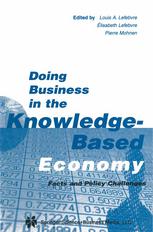

Most ebook files are in PDF format, so you can easily read them using various software such as Foxit Reader or directly on the Google Chrome browser.
Some ebook files are released by publishers in other formats such as .awz, .mobi, .epub, .fb2, etc. You may need to install specific software to read these formats on mobile/PC, such as Calibre.
Please read the tutorial at this link: https://ebookbell.com/faq
We offer FREE conversion to the popular formats you request; however, this may take some time. Therefore, right after payment, please email us, and we will try to provide the service as quickly as possible.
For some exceptional file formats or broken links (if any), please refrain from opening any disputes. Instead, email us first, and we will try to assist within a maximum of 6 hours.
EbookBell Team

4.7
46 reviewsOn September 17 and 18, 1998, a conference took place at Mont Tremblant on the theme "Doing Business in a Knowledge-Based Economy." This conference brought together some hundred participants from government, business and academia, with backgrounds in business administration, engineering, public administration and economics, to provide a multidisciplinary analysis of what has come to be known as the "Knowledge-Based Economy" (KBE). The aim was to come up with suggestions and recommendations about how to do business in a knowledge based economy, both at the firm level and at the government level. All presenters were explicitly asked to conclude with policy recommendations. The conference was sponsored by Industry Canada and organized by the Centre of Interuniversity Research on the Analysis of Organizations (CIRANO). The conference papers offered U.S., Canadian and European perspectives on the management of a knowledge-based economy. This volume is divided into three parts. The papers in part I set the stage by describing the salient features of the KBE. What is so special about it? What are its economic underpinnings? What are its technological characteristics? Knowledge plays a crucial role in a KBE, hence its name. Whereas, in the past, growth was determined primarily by the availability of land, natural resources, labour and capital successively, at the end of the twentieth century, knowledge has become a (if not the) major factor of economic growth.